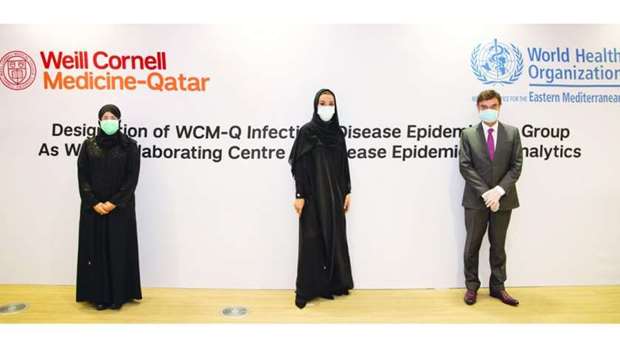*Sheikha Moza attends opening
Pullquote Under the new designation, the Infectious Disease Epidemiology Group (IDEG) at WCM-Q will support WHO’s regional and global efforts to promote health and wellbeing by providing scientific research and advice to inform policy decisions and public health programmes in the Eastern Mediterranean Region (EMR).
Her Highness Sheikha Moza bint Nasser, Chairperson of Qatar Foundation for Education, Science and Community Development (QF), attended an event marking the official designation of a research group at Weill Cornell Medicine-Qatar (WCM-Q) as a World Health Organisation (WHO) Collaborating Centre for combating Covid-19 and other selected infectious diseases in the region.
Under the new designation, the Infectious Disease Epidemiology Group (IDEG) at WCM-Q will support WHO’s regional and global efforts to promote health and wellbeing by providing scientific research and advice to inform policy decisions and public health programmes in the Eastern Mediterranean Region (EMR).

Led by Dr Laith Abu-Raddad, WCM-Q professor of infectious disease epidemiology, IDEG has a special focus on viral hepatitis, which is especially prevalent in EMR countries and is one of the leading causes of deaths globally. The group contributed to efforts in combating the spread of HIV/AIDS, reproductive tract infections and, more recently, Covid-19.
Since the start of the Covid-19 pandemic, IDEG has spearheaded WCM-Q’s efforts to work closely with the Ministry of Public Health (MoPH) and Hamad Medical Corporation (HMC) as they confront the infection’s spread, working with healthcare and policy experts to provide scientific technical analyses that has supported the Covid-19 national response.
HE Dr Hanan Mohamed al-Kuwari, Minister of Public Health and managing director of HMC, said: “The members of the IDEG are doing fantastic work with senior experts and officials in the MoPH and HMC to ensure we minimise the spread of the coronavirus in Qatar. Being awarded World Health Organisation Collaborating Centre status on WCM-Q is a huge achievement, and further strengthens Qatar’s ability to fight infectious diseases that affect communities all over the EMR region and beyond.”
She added, “This official designation demonstrates the success of Qatar’s investment in the healthcare and research sectors, and reinforces Qatar’s contribution to public health on a global level. On behalf of the health sector, I would like to thank Her Highness Sheikha Moza bint Nasser, Chairperson of Qatar Foundation, for her vision and leadership in creating a culture of research excellence in Qatar Foundation and in WCM-Q."
Dr Ahmed al-Mandhari, WHO regional director for the Eastern Mediterranean, said: “The designation of the Infectious Disease Epidemiology Group of Weill Cornell Medicine-Qatar as a WHO Collaborating Centre recognises a history of more than a decade of collaboration in the field of infectious diseases and provides a formal framework for future joint activities. Collaborating centres such as IDEG are our critical partners in our endeavour to achieve our vision for the region, ‘Vision 2023’, with its goal of ‘Health for All, by All’.

“The Collaborating Centre could also play an important role in support of another important joint initiative between WHO and the Qatar Fund for Development in addressing emergencies, including infectious diseases such as Covid-19, and the provision of essential health services in selected countries of the region.”
IDEG lead Dr Abu-Raddad noted: “It is very gratifying for our research team to receive this honuorable designation from the WHO. We are very pleased and proud to be able to support the work of the WHO in combating infectious diseases and their impact on people in Qatar, the EMR region and beyond. We also feel very privileged to have been in a position to provide scientific and technical support to the Ministry of Public Health and the State of Qatar during the coronavirus epidemic.”
Dr Javaid Sheikh, dean of WCM-Q, added: “All of us at WCM-Q are extremely proud of the excellent work of the Infectious Disease Epidemiology Group. Its members’ dedication to promoting public health, for more than a decade, has led to this distinguished designation of the group as a WHO Collaborating Centre. This honour demonstrates the global impact of the scientific capacity and infrastructure that has been built in Qatar with the support of Qatar Foundation.
"I offer my warmest thanks to HE Dr Hanan al-Kuwari and other esteemed colleagues at the Ministry of Public Health and World Health Organisation for giving us the opportunity to work with them to tackle the Covid-19 pandemic and other infectious diseases.”
The designation of the IDEG comes after a decade of high-profile studies on the epidemiology of infectious diseases on the national, regional and international levels, which has helped inform public health policy and programmes, WCM-Q said in a statement.
The group will carry out activities in support of key WHO programmes aimed at combating the spread of infectious diseases, specifically HIV/AIDS and hepatitis, that have a severe negative impact on the health and wellbeing of communities all over the EMR and beyond. This means that Qatar, thanks to its investment in biomedical research infrastructure and scientific human capital in recent years, will be host to a valuable resource working to promote the health and wellbeing of people right across the region and globally.

